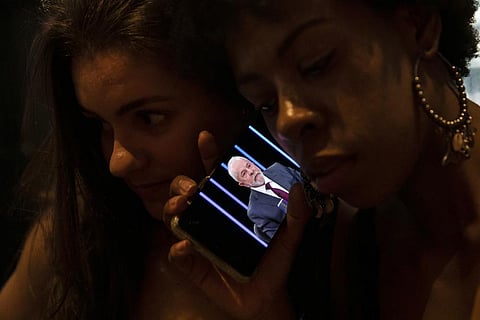

Brazil's presidential race will come to an end on October 30. Neither of the candidates, the far-right incumbent president Jair Bolsonaro and former President Luiz Inácio Lula da Silva, gained over 50% in a first-round vote held on October 2. This has led to Sunday’s run-off vote.
Meanwhile, there are fears among the voters whether Bolsonaro will accept defeat if he loses to the leftist leader. This was particularly after the incumbent president's senator son, Flávio Bolsonaro claimed that the president victim of “the greatest electoral fraud ever seen” amid unproven allegations of foul play.
Lula da Silva, 76, was president from 2003 to 2006 and 2007 to 2011. He reportedly left office with a 90% approval rating – a record tarnished however by Brazil’s largest corruption probe, dubbed “Operation Car Wash,” which led to charges against hundreds of high-ranking politicians and businesspeople across Latin America. He was convicted for corruption and money laundering in 2017, but a court threw out his conviction in March 2021, clearing the way for his political rebound “in a plot twist worthy of one of the Brazilian beloved telenovelas,” CNN quoted Bruna Santos, a senior advisor at the Wilson Institute’s Brazil Center as saying.
Da Silva’s 2022 presidential run marks the latest twist in his remarkable story as one of Brazil’s most charismatic politicians, one who didn’t learn to read until he was 10 and who left school after fifth grade to work full-time, a CNN report says.
Bolsonaro, who took office in January 2019, "has attacked democratic institutions, downplayed the severity of Covid-19 and attacked environmental protections, as well as reviving Cold War-era divisions to paint opponents as communists," the report noted.
Evangelicals:
Reports suggest that Bolsonaro can no longer count on his traditional voters, the evangelicals. Lula, according to El Pais, is said to have performed significant outreach among the evangelicals.
On October 19 - in response to false and transphobic messages being spread by the Bolsonaro campaign - Lula published an “open letter to Christians,” in which he vowed to protect religious freedom and not impose unisex bathrooms in public places. On the issue of abortion, he claimed to be opposed to the right to choose but he was quick to remind anti-choice voters that this issue was in the hands of Congress, not the executive branch, El Pais report added.
Who Leads?
The NPR reports that currently, all major polls have da Silva in the lead, but Bolsonaro has been gaining on him. On Oct 2, da Silva captured 48% of the vote compared to Bolsonaro's 43% — a difference of nearly 6 million voters. The big story then was Bolsonaro's better-than-expected showing; most surveys had him trailing by double digits. Polling firms scrambled to understand why their numbers were so far off when it came to predicting Bolsonaro's support. Some lawmakers even called for pollsters to be charged with a crime if their forecasts don't match the election results.
On Monday, the IPEC polling firm had da Silva taking 50% of the vote and Bolsonaro 43%, with a margin of error of 2 percentage points.
Dirtiest Campaign
Brazilians have been bombarded with negative ads and social media disinformation in the lead-up to the election, NPR reported. Supporters of Bolsonaro have been telling voters that if elected da Silva will close churches and turn Brazil into a communist nation à la Venezuela and Cuba. Bolsonaro has been fending off accusations of "pedophilia" and cannibalism, based on past statements from the current leader. Electoral authorities have tried to cut down on the noise, passing some of the most restrictive limits on campaign speech in decades. The country's top electoral court justices have imposed severe fines and time limits for removal of false online content. While many liberals applaud the officials' attempts to clamp down, conservatives have accused authorities of censorship.